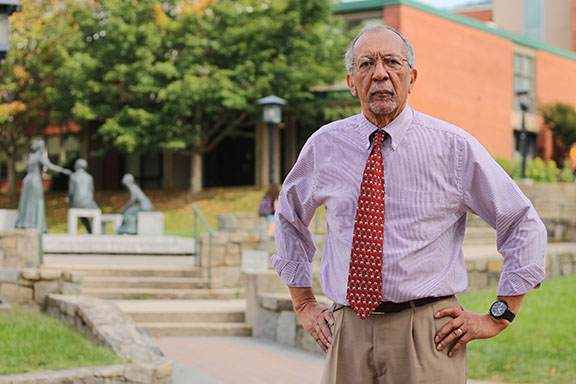
James Barnes’ higher education experience started almost half a century ago.
In 1964, he began as a faculty member at Ohio University, and while his location has changed, Barnes has never left his chosen field.
His love for higher education took him to France and earned him time as a department chair and as a dean before coming to Appalachian State University seven** years ago, he said.
Barnes, who also teaches a class in the Appalachian government and justice studies department, has decided to take on a new challenge: the university’s new ombudsman.
The ombud’s office is a place students, faculty and staff can go to anonymously receive guidance or advice regarding problems on campus. No names are ever reported, except in some cases in which the legality of a situation requires it, Barnes said.
“It’s a place to get advice without it being on the record,” he said.
The office also “track[s] patterns of systemic problems on campus and forward[s] suggestions for changes in policy, or the consideration of alternative strategies, to the university administration,” according to ombuds.appstate.edu.
The office, however, does not provide psychological counseling or legal advice.
This position started as a casual conversation between Barnes and the Provost & Executive Vice Chancellor Lori Gonzalez last school year, Barnes said.
Gonzalez mentioned the position to Barnes, and since Barnes had experience as an ombudsman at Ohio University in the 1970s, he became interested in the possibility of running the office.
Barnes started this position on an interim basis after more conversations with Gonzalez in spring 2013, but said the office is just getting started.
“It’s been very hectic,” he said. “The biggest challenge has been to find space [for an office]. There’s not much – if any – space left.”
Over the summer, Barnes collected furniture from the Broyhill Events Center to furnish his new office in I.G. Greer. The office also built a website and hopes to soon start a publicity campaign to spread the word about the ombud’s position and office.
Despite the work, Barnes said he has enjoyed creating the position at Appalachian.
“It’s the challenge of doing it and doing it well in a short period of time,” he said.
Gonzalez said choosing Barnes to fill the ombud position was the logical choice.
“I am confident that he can lead the office and provide an invaluable service to the campus,” she said. “He has long been seen as a campus leader and this new role is an extension of his dedication to Appalachian.”
Victoria Ford, a graduate student studying college student development, is working in the ombud office while she completes her degree. She said this position and opportunity to work with Barnes seemed like a great opportunity for hands-on experience.
“He has a lot of experience and information to share,” Ford said. “When things start to pick up more, I know I’ll learn a lot from him.”
**Correction: The article states that James Barnes came to Appalachian State University seven years ago. Barnes came to the university 17 years ago. The Appalachian apologizes for the error.
Story: CHELSEY FISHER, Senior News Reporter
Photo: MOLLY COGBURN, Intern Photographer

